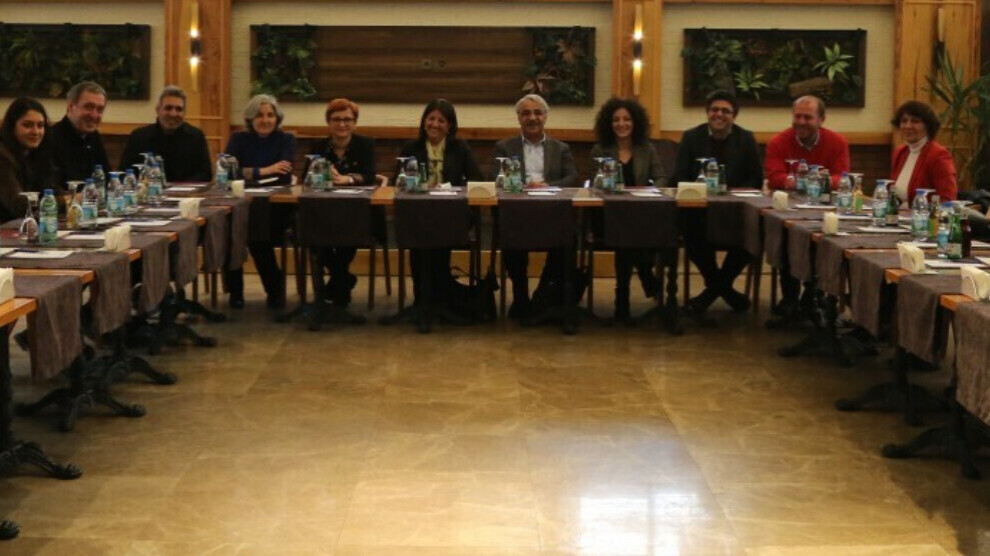
Ahval
Last Updated On: Mar 01 2022
President Recep Tayyip Erdoğan said Turkey will exercise its legal rights to control shipping through the Bosporus Straits to the Black Sea due to the war in Ukraine.
“Turkey is determined to use the authority given by the Montreux Convention on the Turkish Straits in a manner to prevent escalation of the Russia-Ukraine crisis,” Erdoğan said at a televised news conference late on Monday after a meeting of his cabinet.
Under the 1936 Montreux Convention, Turkey is in charge of regulating the passage of ships into and out of the Black Sea and has the power to close them to warships. Russia has large naval bases in the Black Sea, where Ukraine is also located.
Erdoğan repeated his disappointment at Russia's decision to go to war with Ukraine and reiterated an offer to mediate between the two countries, which he called friends of Turkey.
“It Turkey is not a warring side, it has the authority to stop the ships of warring countries from transiting the straits,” Foreign Minister Mevlüt Çavuşoğlu said after the cabinet meeting, according to the state-run Anadolu news agency.
“If warships are returning to bases in the Black Sea then passage is not restricted. We are implementing the provisions of Montreux. We have warned all countries on the Black Sea and elsewhere to not sail warships through the Straits. Furthermore, there has been no request for passage.”
According to the Montreux convention, Black Sea nations must notify Turkey eight days in advance of their warships, including submarines, transiting the straits. Ships belonging to other nations require 15 days notice. The decision to block ships could affect an estimated 16 Russian warships and submarines currently in the Mediterranean, some of which are part of their Black Sea fleet.
In anticipation of any disruption to Turkey’s energy supplies from the conflict, the Turkish leader announced that taxes on energy would be cut and a discount would be provided for electricity providers.
On Saturday, a phone call took place between Ukrainian President Volodymyr Zelensky and Erdoğan in which Zelensky praised Erdoğan for his support in the ongoing war with Russia. After the call, Zelensky tweeted his thanks to Turkey for a "ban on the passage of Russian warships" to the Black Sea. Turkish officials refuted that any such decision had been made.
A day later, Çavuşoğlu said that a state of war existed between Russia and Ukraine, citing an analysis provided by Turkish legal experts. That distinction would allow Turkey to move forward with closing the Straits if it chose to do so, he said.
On Monday, Erdoğan refrained from explicitly saying whether Turkey would restrict access to Russia’s warships. Since the initial warnings that Russia was planning to invade Ukraine in late 2021, Turkey has tried to position itself as a neutral between Ukraine and Russia while offering mediation.
Erdoğan said that Turkey was ready to fulfill its commitments as a member of NATO and a supporter of international efforts to end the war, but made it clear that it could not sacrifice its own interests by taking sides.
“Turkey will not give up its national interests but won’t neglect the regional and global balance either," he said. "We won’t turn away from Russia or Ukraine."
Diplomatic efforts by the United States and European Union were unable to prevent Russia from launching what President Vladimir Putin called a “special military operation” into Ukraine on Feb. 24. Prior to the invasion, Moscow demanded that the West refuse Ukraine membership in NATO, halt any expansion of the alliance and retreat to its pre-1997 boundaries in Central and Eastern Europe. The West refused.
Erdoğan said he was sceptical of what he considered Russia’s excessive demands, but has also criticised the West for being indecisive in halting the emerging conflict. Turkey has not joined in on sanctions against Russia despite condemning the 2014 annexation of the Crimean Peninsula. Erdoğan has also built up a personal rapport with Putin in subsequent years and the two countries cooperate on key regional issues such as Syria.
Russia has rejected Erdoğan’s offers to negotiate a solution to the conflict. Moscow has also been sharply critical of Ankara’s military exports to Ukraine, including shipments of its TB-2 Bayraktar drones that have been assailing Russian convoys and troop formations in the last week.
This has not prevented Turkey from continuing to pursue talks with Russia. Over the weekend, Çavuşoğlu and Defence Minister Hulusi Akar spoke to their counterparts in Moscow to encourage de-escalation. Azerbaijani President Ilham Aliyev encouraged Putin to consider Turkish-Azeri mediation of the conflict.
Although Turkey has been critical of Western diplomacy and sanctions, Turkish diplomats have been in touch with their Western counterparts throughout the crisis.
İbrahim Kalın, Erdoğan 's chief foreign policy advisor, spoke over the phone on Monday with Biden's national security advisor Jake Sullivan about the war and reiterated Turkish support for Ukraine. According to Erdoğan’s office, Kalın and Sullivan agreed to “intensify efforts towards a ceasefire”.
Representatives from Ukraine and Russia met on the Ukrainian side of the border with Belarus on Monday to discuss terms for a possible ceasefire. The talks did not produce an initial outcome, but the two sides agreed to convtinue negotiations.

Turkey could be forced to take sides with West in Ukraine war - scholar
Mar 01 2022
Turkey could be forced to take sides with the West in the Ukraine war by banning the passage of Russian warships through the Bosporus Straits to the Black Sea under the Montreux Convention, said Serhat Güvenç, a professor of international relations at Istanbul's Kadir Has University.
Turkey may be selling a decision this week to implement the convention as an obligation under international law, but the move signals where Ankara could lean if the war continues, Güvenç told CNN television on Monday.
"Turkey has decided to align more with its traditional allies in NATO and the European Union, and a bit away from Russia," he said.
The Ukraine, which views the presence of Russian warships in the Black Sea as a threat, has made an official request to Turkey to close the straits to Russian ships.
On Monday, President Recep Tayyip Erdoğan announced that Turkey would use the authority given by the Montreux Convention to restrict access to the Black Sea. Foreign Minister Mevlüt Çavuşoğlu warned all warring and non-warring countries against sailing their warships through the straits.
The Montreux Convention, signed in Switzerland in 1936, grants Turkey rights to regulate maritime traffic through the straits and to close them to warships of countries in a state of war. The 1936 treaty does however allow for the ships of warring countries to return to their bases in the Black Sea.
Russia has already completed a naval buildup in the Black Sea by shifting units from the Baltic ahead of the start of hostilities, Güvenç said.
"They [Russia] probably have enough resources to sustain their naval power in the Black Sea for about two to three months," Güvenç said. "But if conflict drags on, it'll be a different story."
Six Russian warships and a submarine passed through the Bosporus and Dardanelles straits on Feb. 8, Tass reported at the time, for naval drills near Ukraine.
Implementing the treaty is in Ankara's best interest because it supports Turkey during times of war, Güvenç said.
“Any exception made to please Russia could jeopardise the treaty's credibility in the long run,” he said.
NATO member Turkey has built close relations with Russia over the past five years, raising concern among fellow NATO members. In 2019, it acquired advanced S-400 air defence missiles from Moscow. In response, the United States has barred Turkey from a programme to develop and purchase the advanced F-35 stealth fighter jet.
Russia also supplies the largest number of visitors to Turkey’s tourism industry. Turkey, which lies south of Ukraine over the Black Sea, has sold armed drones to Kyiv, and has sought to increase cooperation in defence and economic matters.





 © Security Service of Ukraine/Telegram A series of text messages allegedly written by a Russian soldier before he was killed in combat were published by the Security Service of Ukraine. The texts say that civilians were “hit” in the Russian invasion of Ukraine.
© Security Service of Ukraine/Telegram A series of text messages allegedly written by a Russian soldier before he was killed in combat were published by the Security Service of Ukraine. The texts say that civilians were “hit” in the Russian invasion of Ukraine.














